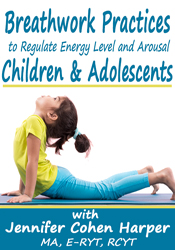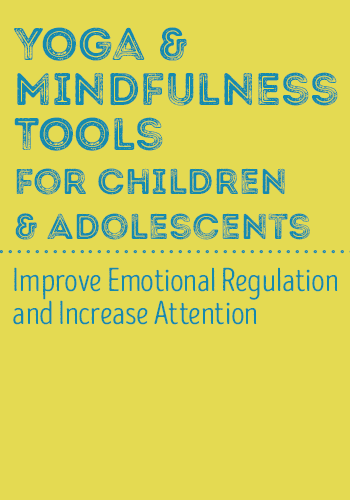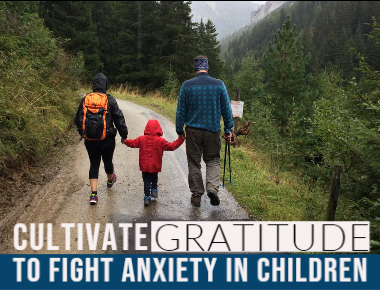Cultivate Gratitude to Fight Anxiety in Children
Showing appreciation for our kids makes it easier for them to appreciate others, and themselves.

Anxiety is on the rise in our culture, both for adults and for our children. As caregivers, we want to do everything we can to reduce anxiety and help our kids thrive. While there are many things we can do to help our kids navigate anxiety when it shows up, one powerful way to reduce intrusive thoughts, rumination, and other anxiety driven symptoms is by practicing gratitude in day to day life.
Practicing gratitude regularly helps us build a brain primed to see the positive. The human brain has a strong negativity bias. It helps us survive, but not thrive. Gratitude counters that bias so we can enjoy life to the fullest. It makes it easier to see the positive with, or even before, the negative.
Here are some thoughts to consider, and practices to explore, with the children in your life.
When we pause and appreciate the good around us (explicitly exploring what we feel, think and sense in our body) we show our children that gratitude is worth taking the time for. It’s not just about saying Thank You! It’s things like “This sunset is beautiful. I’m so glad I have eyes to see it with, and you to share it with. Let’s sit down and watch. What colors can you see?”
Bringing this kind of specific attention to the positive aspects of daily life is especially helpful if you (or other adults in the child’s life) tend to talk about or give a lot of energy to the challenging or negative experiences.
Feeling gratitude and saying thank you aren’t the same. Pressure to say specific words can cause anxiety, and lead to resistance and resentment (which kills gratitude!). Remember, the end result of doing something positive for a child should be feeling good. If kids do what we want them to do under duress, it just creates a negative association in their mind with that good thing, making them less likely to do it when they aren’t being told to.
One way to help our kids when we are in what I call a “thank you stand off” (you’re waiting for your kid to say thank you and it’s not happening) is to show gratitude yourself. Saying something like “Thank you so much for thinking of Sam. I really appreciate it” models a positive response in an authentic way, without shaming your child. Then you can chat about it at home and even practice a bit for next time. Talk with your child about what they were feeling. Often it’s hard for kids to say thank you in the moment if they feel like all eyes are on them. Taking some space and calling later or writing a thank you note are wonderful options to express appreciation with less pressure.
We can help kids develop an attitude of gratitude through regular rituals and activities that build mental habits. If the whole family participates it will also lead to increased feelings of connection with each other. Some examples include:
Letting our kids know we are grateful for them (in specific ways that validate who they are) gives them an embodied experience of what it feels like to be appreciated. It fights anxiety by building up the child’s sense of self, and strengthens your relationship while supporting their capacity to feel gratitude. When we feel appreciated, it’s much easier to appreciate ourselves, others and the world around us!
Start a daily gratitude and self-compassion practice with your children at bedtime with Thank You Body, Thank You Heart.
Use code LFY10 for 10% off any of Jennifer Cohen Harper’s products including, Thank You Body, Thank You Heart, Mindful Chair Yoga Deck and Yoga and Mindfulness Practices for Children Card Deck
Practicing gratitude regularly helps us build a brain primed to see the positive. The human brain has a strong negativity bias. It helps us survive, but not thrive. Gratitude counters that bias so we can enjoy life to the fullest. It makes it easier to see the positive with, or even before, the negative.
Here are some thoughts to consider, and practices to explore, with the children in your life.
Cultivating gratitude in kids starts with modeling from their most important grown-ups.
When we pause and appreciate the good around us (explicitly exploring what we feel, think and sense in our body) we show our children that gratitude is worth taking the time for. It’s not just about saying Thank You! It’s things like “This sunset is beautiful. I’m so glad I have eyes to see it with, and you to share it with. Let’s sit down and watch. What colors can you see?”
Bringing this kind of specific attention to the positive aspects of daily life is especially helpful if you (or other adults in the child’s life) tend to talk about or give a lot of energy to the challenging or negative experiences.
Forced thank you’s can backfire.
Feeling gratitude and saying thank you aren’t the same. Pressure to say specific words can cause anxiety, and lead to resistance and resentment (which kills gratitude!). Remember, the end result of doing something positive for a child should be feeling good. If kids do what we want them to do under duress, it just creates a negative association in their mind with that good thing, making them less likely to do it when they aren’t being told to.
One way to help our kids when we are in what I call a “thank you stand off” (you’re waiting for your kid to say thank you and it’s not happening) is to show gratitude yourself. Saying something like “Thank you so much for thinking of Sam. I really appreciate it” models a positive response in an authentic way, without shaming your child. Then you can chat about it at home and even practice a bit for next time. Talk with your child about what they were feeling. Often it’s hard for kids to say thank you in the moment if they feel like all eyes are on them. Taking some space and calling later or writing a thank you note are wonderful options to express appreciation with less pressure.
Family rituals and engaging activities can make gratitude a habit.
We can help kids develop an attitude of gratitude through regular rituals and activities that build mental habits. If the whole family participates it will also lead to increased feelings of connection with each other. Some examples include:
- Practicing a one word gratitude circle at meals or another time that works for your family.
- Naming aspects of our own body, mind and heart that supported us that day at bedtime.
- Keeping a gratitude journal (these can be individual, but you can also create a family journal that everyone can contribute to).
- Creating gratitude web art projects for things children enjoy or appreciate. A gratitude web of ice cream, for example, may have ice cream in the middle, and then around it would be the grown up who worked to buy it, the people at the shop or store who sold it to us, the person who made it, the farmer who milked the cow, the cow itself, etc.
Showing appreciation for our kids makes it easier for them to appreciate others, and themselves!
Letting our kids know we are grateful for them (in specific ways that validate who they are) gives them an embodied experience of what it feels like to be appreciated. It fights anxiety by building up the child’s sense of self, and strengthens your relationship while supporting their capacity to feel gratitude. When we feel appreciated, it’s much easier to appreciate ourselves, others and the world around us!
Start a daily gratitude and self-compassion practice with your children at bedtime with Thank You Body, Thank You Heart.
------------------------
------------------------
Looking for more ways to improve emotional regulation and increase attention?

With this breathwork exercise, you'll help children regulate their energy and arousal level which is key to their capacity to improve self-regulation and engage fully at school and at home.
This powerful tool works directly with our nervous system in support of self-regulation Watch this video now!
This powerful tool works directly with our nervous system in support of self-regulation Watch this video now!

Register for this transformational online course, Yoga & Mindfulness Tools for Children and Adolescents
Walk away with time tested and well researched practices to help the children you work with manage impulse control, improve self-regulation of emotions, and enhance their ability to focus.
Plus, when you register today, you'll also receive up to 10.75 CE hours and 3 free bonus videos.
Walk away with time tested and well researched practices to help the children you work with manage impulse control, improve self-regulation of emotions, and enhance their ability to focus.
Plus, when you register today, you'll also receive up to 10.75 CE hours and 3 free bonus videos.
Meet the Expert:
Jennifer Cohen Harper, MA, E-RCYT, is an author and educator who works to support all children and teens in the development of strong inner resources through the tools of yoga and mindfulness. Her goal is to help kids, and those who care for them, thrive in the world regardless of circumstances, and navigate the many challenges they face with a sense of personal power and self-awareness.
Learn more about her educational products, including her upcoming live seminars, by clicking here.
Learn more about her educational products, including her upcoming live seminars, by clicking here.



